
Chimichurri: The Argentinian sauce eaten as a ritual
Martina Ezcurra sprinkled coarse salt on the large flank steak in front of her, then massaged it in with her hands. With a smile, she told me that even if men claim to be the asador (South American barbecue master), it is Argentine women who prepare the best meat.
Next to the seasoned steak on the marble kitchen table stood a bowl filled with the chimichurri she had prepared earlier that morning: a blend of finely chopped parsley, oregano, ground chilli and minced garlic mixed with vinegar and vegetable oil. The bright green sauce looked like Italian pesto but was something else entirely. And later that day, I would learn to spread it on the roasted meat like a priest anointing something with holy oil.
 In Argentina, people invite each over for an asado, a traditional South American barbecue
In Argentina, people invite each over for an asado, a traditional South American barbecue
In Ezcurra's courtyard at her conventillo – a type of shared home in Buenos Aires where 19th-Century Italian immigrants once lived – her family and friends sat and chatted while awaiting the feast that was to come. In the back of the open space, surrounded by lush green trees, Ezcurra's son Joaquin tended to the hot coals and meat, asking for a steady replenishment of Malbec: it takes hours to cook an asado and it's custom to never let the asador's glass go dry. When Joaquin brought the first cuts of steak to the table on a wooden chopping board, everyone reached for a serving. He assembled a plate for me, following something that resembled a ritual: first he grabbed a piece of warm bread, then he chose a slice of meat and finally he spread on a generous spoonful of chimichurri.
At first, the chimichurri tasted refreshing and grassy, but then it revealed a lingering spiciness and pungency from the garlic. It was my first time trying the green sauce and I was amazed by how harmoniously it blended with the flavours of the savoury and smoky beef. I complimented Joaquin and his mother, who in exchange said, with a smile, that I was now part of the family, as though I'd fulfilled a rite of passage.
While chimichurri is a classic accompaniment to steak, it's also used as a go-to flavouring for just about any kind of meat dish in Argentina, from choripan (grilled chorizo) to meat empanadas. During my travels in the country, chimichurri was a constant presence. It hit my nose during a walk at the San Telmo Fair, an antique fair held in Buenos Aires on Sundays. It was in a jar on the counter of a choripan vendor at the entrance of the Bombonera, the Boca Juniors football stadium. It was on tasting tables of the Mendoza region's vineyards; at road-side restaurants throughout the desert highlands of Salta and Jujuy; and near an open fire cooking cordero al palo (slow-roasted lamb) amidst Patagonian winds. It was everywhere.
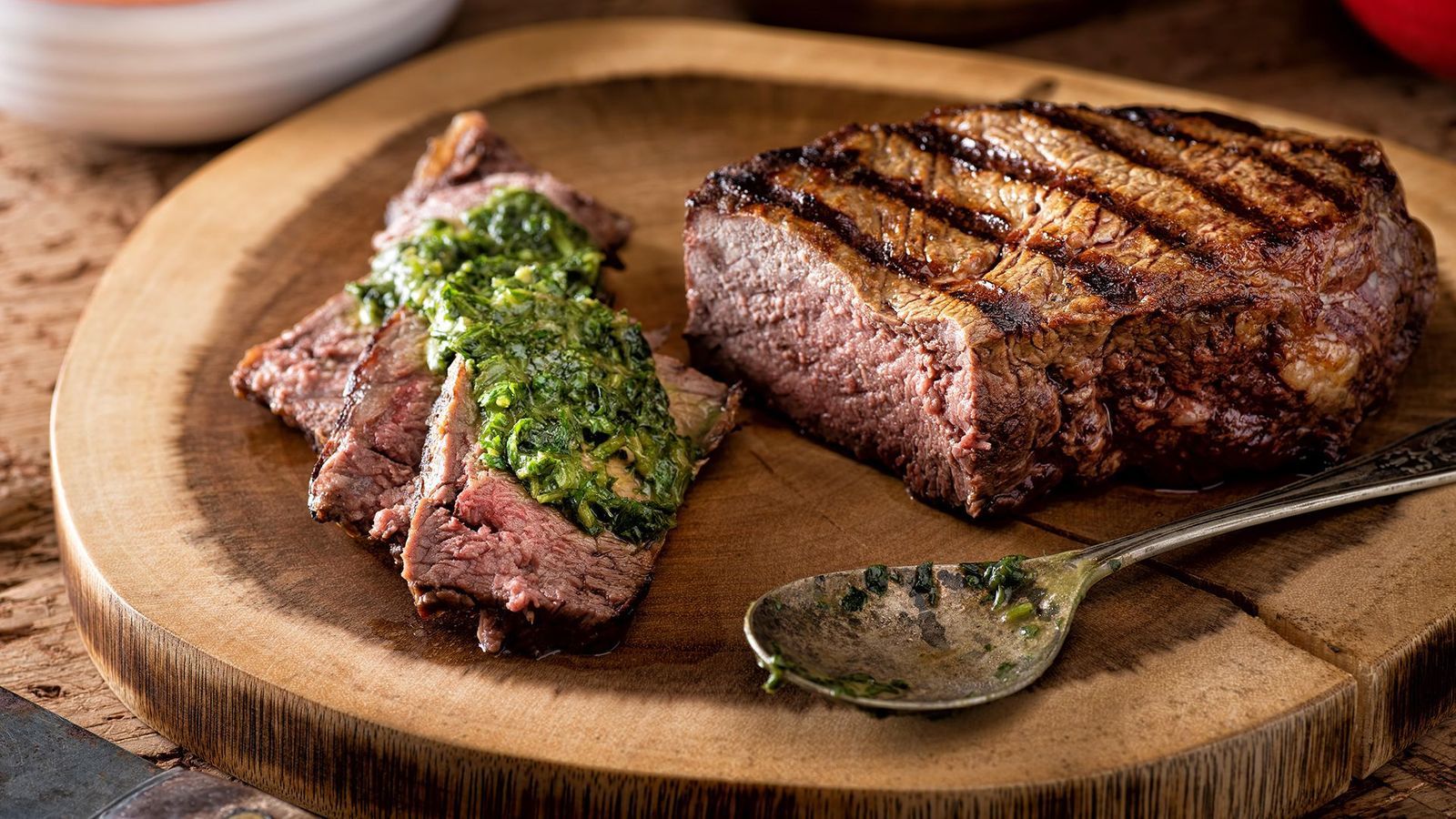 In Argentina, chimichurri is a classic accompaniment to steak
In Argentina, chimichurri is a classic accompaniment to steak
There are various legends about the birth of chimichurri and its name, with the most famous claiming that it was 19th-Century Irish immigrant James (Jimmy) McCurry, who, longing for Worcestershire sauce – a popular condiment in the UK and Ireland that's made of vinegar, molasses, garlic, anchovies and other ingredients – decided to create another flavoursome condiment with local ingredients. Supposedly, the sauce took his name "Jimmy McCurry", which became "chimichurri" with Argentinian pronunciation.
Others believe the name "chimichurri" came about in the early 1800s during the failed British invasion of Rio de la Plata, the estuary that separates Argentina from Uruguay, when captive British soldiers asked for condiments by saying, "give me the curry", which Argentines translated into "chimichurri". Still another story alleges that the sauce arrived in the late 19th and early 20th Centuries with Basque migrants, who with their millenary wood-fired grilling culture brought along tximitxurri (pronounced "cheemeechooree"), a Basque-style herb sauce that typically includes herbs, olive oil, vinegar, garlic and Espelette pepper.
And though many Argentines would proudly claim that it was their own grandmother who invented the sauce, some say that its roots go back to before Christopher Columbus came to the Americas in 1492. According to Daniel Balmaceda, an Argentinian historian and author, the word "chimichurri" comes from the Quechua, an Indigenous population who have lived in the Andean region of northern Argentina since well before the arrival of Europeans. "It was a generic term used to describe strong sauces to accompany and conserve different kinds of meat," Balmaceda said.
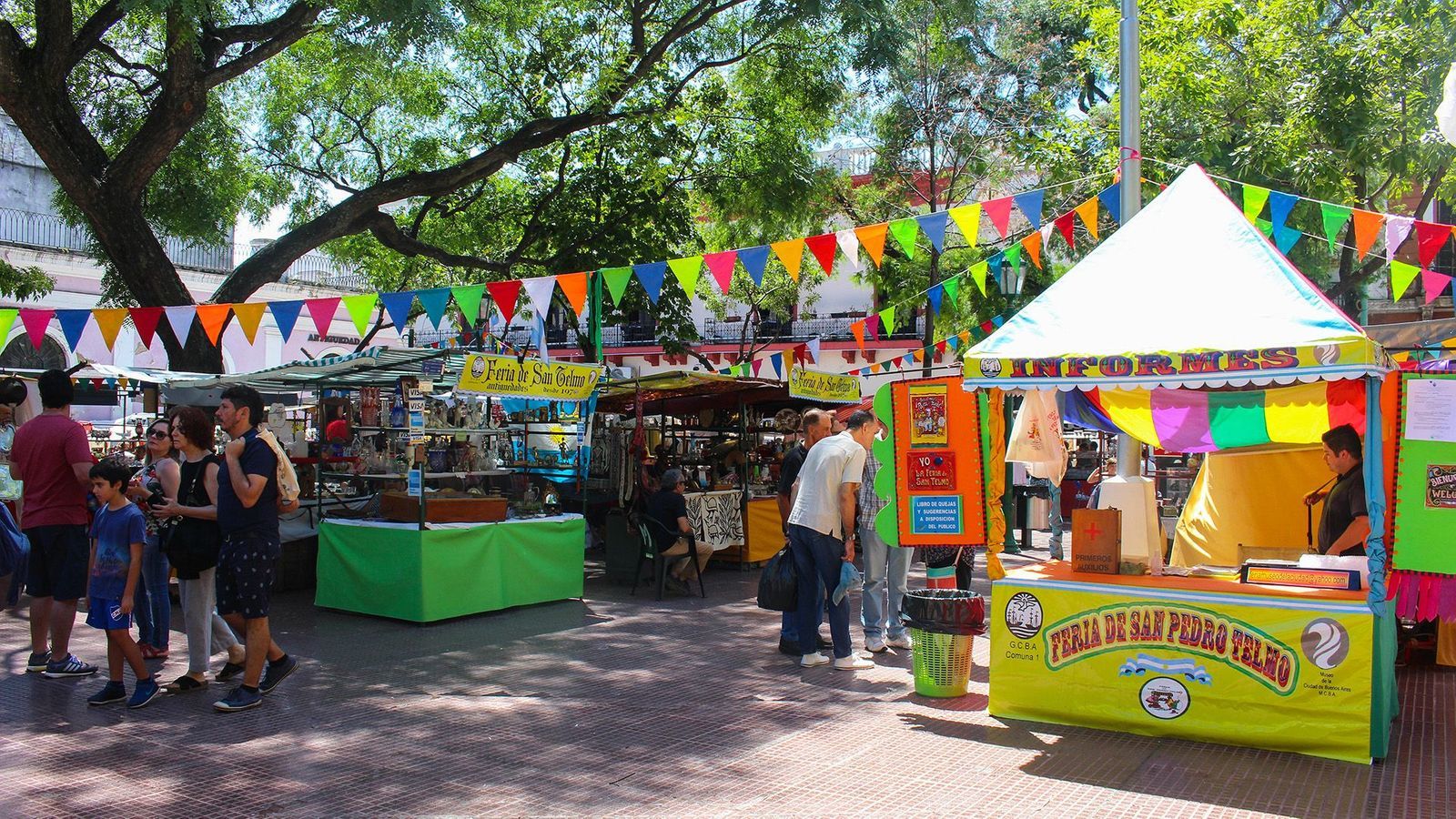 San Telmo Fair is an antique fair held in Buenos Aires
San Telmo Fair is an antique fair held in Buenos Aires
Whether of Irish, English, Basque or Quechua origin, by the end of the 19th Century, chimichurri was used primarily to accompany, and often cover, the strong taste of freshly butchered meat cooked on the barbecue, which was brought to the country by Spanish immigrants.
Donato De Santis, one of the hosts of MasterChef Celebrity Argentina, said that today, as Argentines eat about 86kg of meat per capita a year (placing them third in the world ranking), chimichurri is ever-present in every Argentine family. "It conserves an intense love," De Santis said. According to him, preparing chimichurri is a ritual, and families exchange it with pride; it is both an excuse for a conversation and a form of cultural exchange.
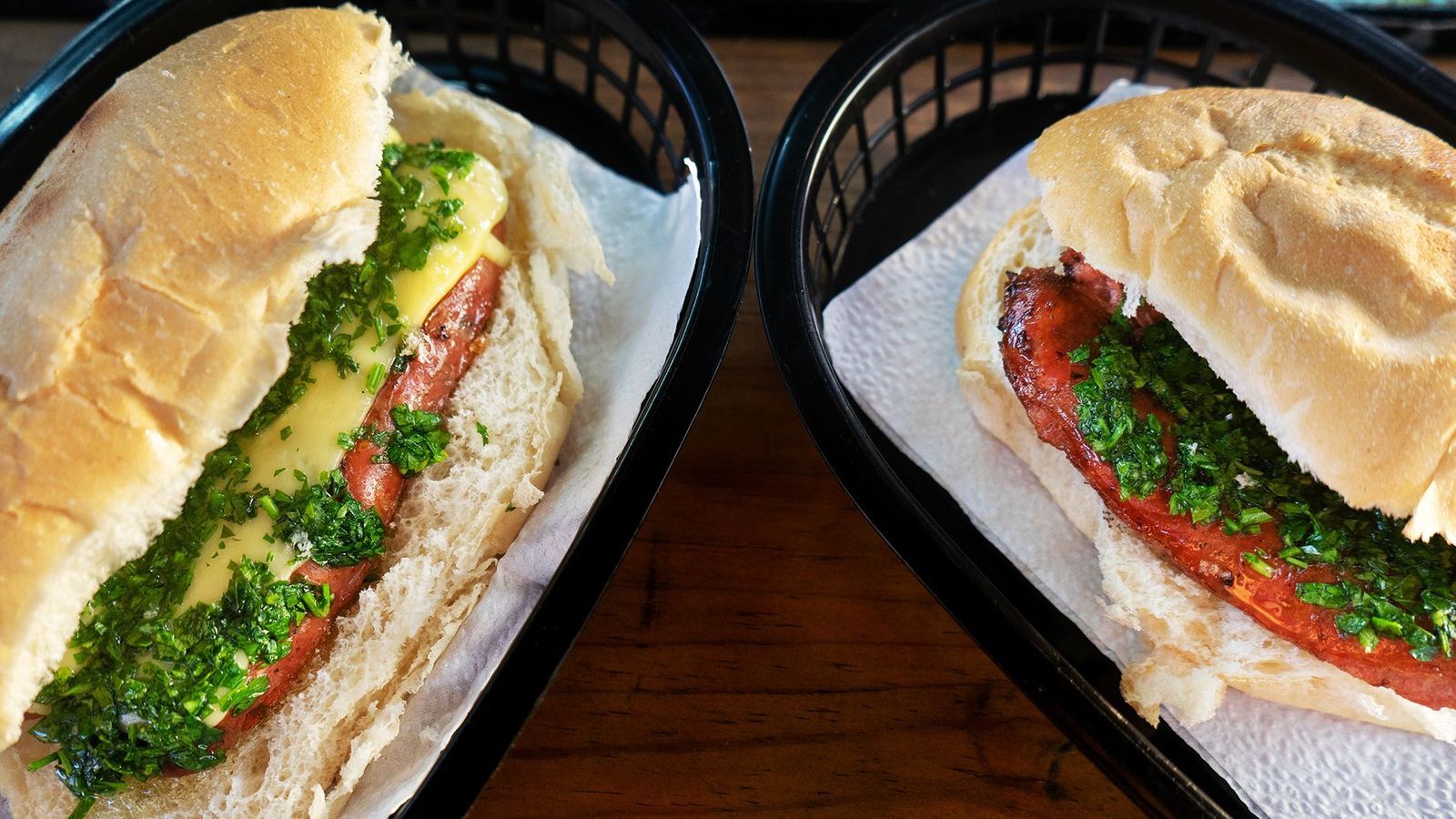 Choripan, an Argentinian sausage sandwich with chimichurri, is often sold at stadiums
Choripan, an Argentinian sausage sandwich with chimichurri, is often sold at stadiums
"Chimichurri means friendship, and in Argentina, this has a meaning that does not exist in other places of the world," said Eduardo Massa Alcantara, an Argentine chef and a TV host. According to him, friends meet for a beer in England and coffee in Italy, but in Argentina, people invite each over for an asado. And they gather to barbecue despite the polarising political beliefs that are prevalent in the country due to its nine bankruptcies since becoming independent from Spain in 1816 and tensions between left-wing populist and right-wing dictatorial beliefs.
Some say that opposition is just a part of Argentinian culture, including its food. "Argentinian gastronomy is like Argentina, it's polarising," said Maria De Los Angeles Anglesio, a 33-year-old Argentinian gastronome. "Dulce de leche (caramel) is extremely sweet, mate (tea) is very bitter, asado is full umami, and if you're not used to it, chimichurri is a strong sauce too."
However, instead of creating division, chimichurri brings Argentines together. The sauce stands as a national anthem for all those who were born or migrated to the vast lands of Argentina. It represents a time when the country was the land of hope, which the English travel writer Bruce Chatwin described in his book In Patagonia as the land of fugitives, of those looking for a better life, of those following a dream.
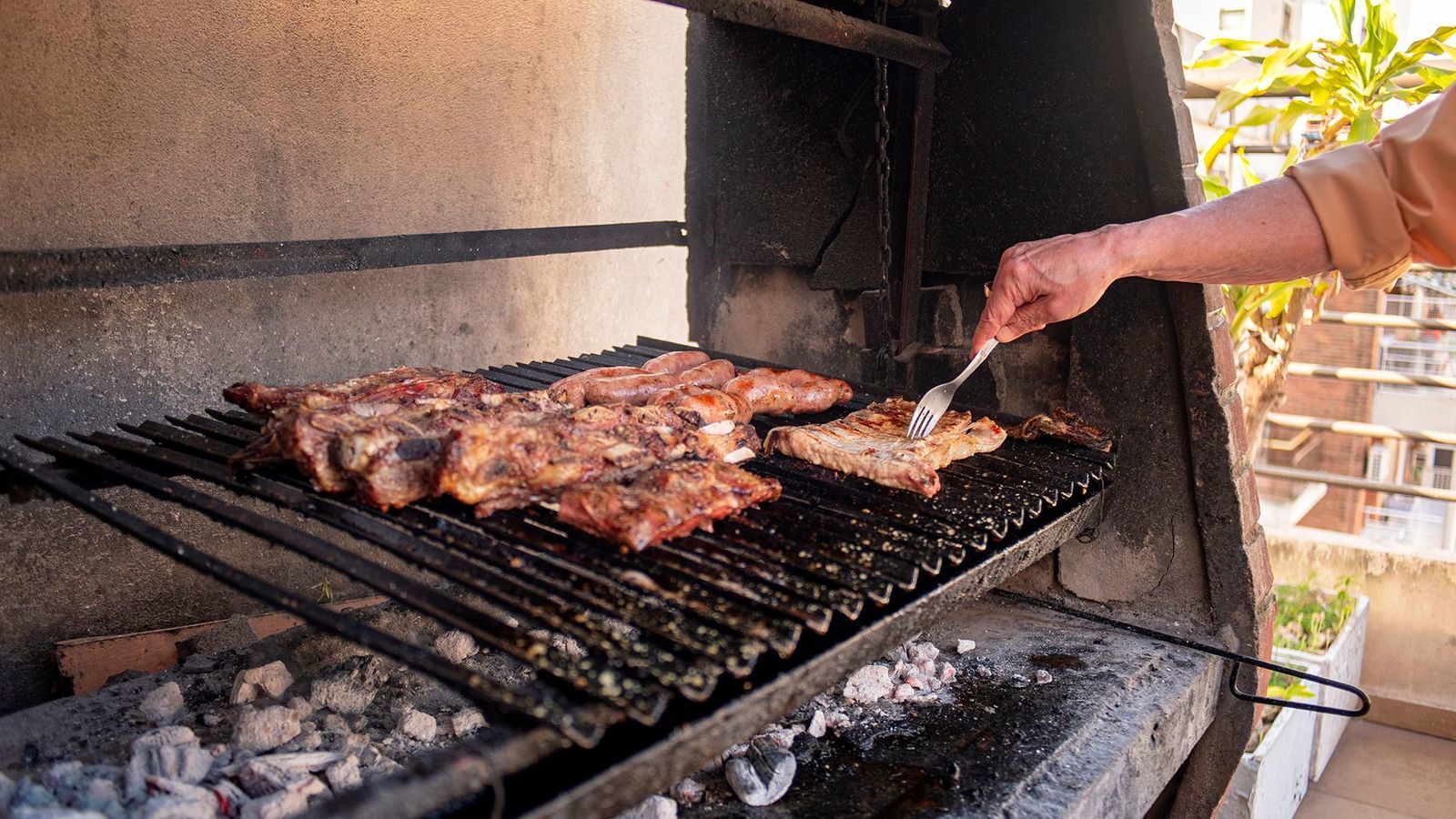 Argentines eat about 86kg of meat per capita a year, placing them third in the world ranking
Argentines eat about 86kg of meat per capita a year, placing them third in the world ranking
"There are as many kinds of chimichurri as there are inhabitants in the Republic of Argentina," said Alcantara, who is also one of the judges of the Chimichurri Cup, a competition held every October at the San Isidro gastronomic fair Bocas Abiertas. Famous chefs, asado lovers and even children show their passion for asado by submitting their chimichurri for competition.
Alcantara said that some people add warm water to help the oil and vinegar emulsify, while others boil the oregano before mixing it with the other herbs. Some Argentines keep a pre-refrigerated liquid base on hand for any occurrence. A few others resort to extreme measures such as burying bottles of chimichurri underground to age and develop the sauce's flavour, adding an air of mysticism to the process. Many avoid using strong tasting oils like olive oil that eclipse the other ingredients' flavours, preferring to use lighter oils like sunflower.
Alcantara, along with other judges, blind tastes hundreds of chimichurris before crowning a winner. For him, the best chimichurri has balanced flavours and complements the taste of the meat without overpowering it.
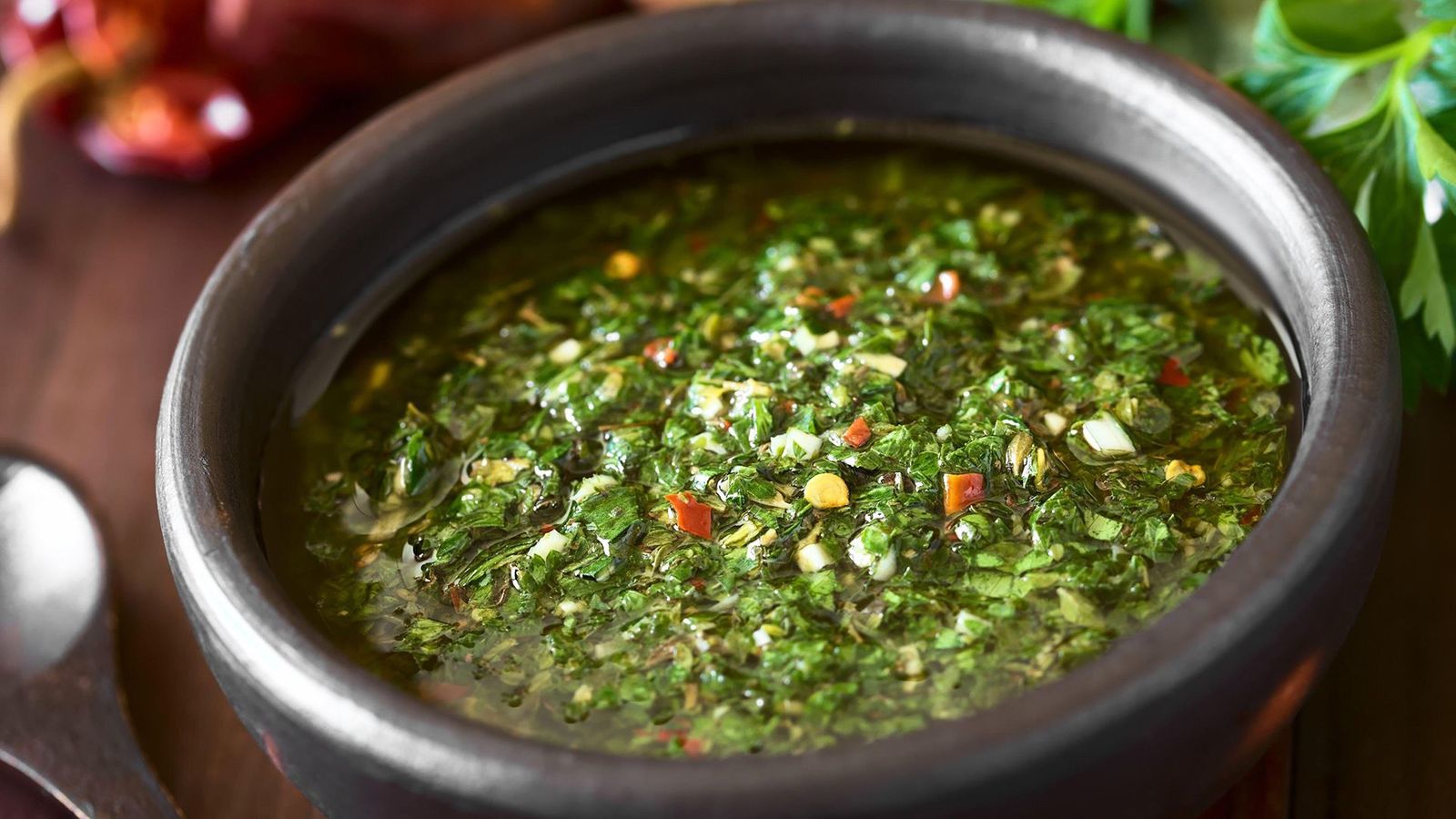 Chimichurri is a blend of finely chopped parsley, oregano, ground chilli and minced garlic mixed with vinegar and vegetable oil
Chimichurri is a blend of finely chopped parsley, oregano, ground chilli and minced garlic mixed with vinegar and vegetable oil
In recent decades, the love for chimichurri has swelled beyond Argentina's borders. Argentinian restaurants have been established worldwide such as New York's Buenos Aires and Gaucho in London, and the sauce has been popularised in cookbooks, online articles and recipes, and how-to videos on YouTube.
Yet, most Argentines would argue that the best chimichurri can only be found in Argentina, particularly at an asado. From Ushuaia in Tierra del Fuego to Iguazu Falls, locals gather to celebrate friendship and food on a Sunday afternoon, stoking the fire, uncorking bottles of Malbec and spreading on generous spoonfuls of the beloved condiment.











